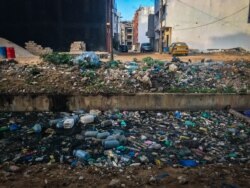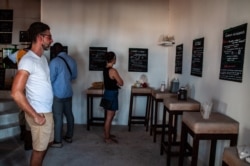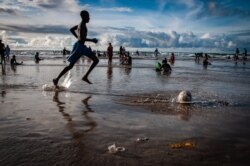Plastic bags, bottles, cigarette butts and other debris lap against the shore of Virage Beach in northwest Dakar, Senegal. Workers from beachside restaurants and surf shops rake the sand to try to capture the waste, but the garbage always returns.
A lack of infrastructure and education surrounding proper waste disposal in the Senegalese capital has resulted in piles of litter inundating the city's streets and beaches. Babacar Thiaw, owner of Copacabana Surf Village, a surf shop and restaurant on Virage Beach that was opened in 1970 by Thiaw's father, is taking matters into his own hands by turning his restaurant into a waste-free haven. It's the first of its kind in the region.
"Growing up here, I see all these problems that the environment is facing with the trash," Thiaw said. "People are just throwing, throwing, throwing, throwing."
Thiaw has spent the past year working with local conservation groups to transition his business into a zero-waste restaurant. He hopes other beachside restaurants will follow suit. But it's a radical idea in a country where the typical person uses multiple plastic cups throughout the day to drink tea - a treasured ritual - and consumes water in small plastic sachets.
Despite having a relatively small population of 15 million, Senegal is one of the world's largest contributors to plastic pollution. A 2010 study by the journal Science estimated the country produced more than 254,000 tons of mismanaged plastic waste that year, making it 21st in the world in annual plastic mismanagement. The United States, which has a vastly larger population and economy, ranked 20th.
At the official launch of Thiaw's newly transitioned restaurant, attendees could read any of the roughly dozen plaques that described the steps Copacabana has taken to reduce waste.
Plastic straws were abandoned in favor of those made from metal and bamboo, and a refillable water jug had replaced the 100 bottles customers used to consume each week.
The restaurant also switched from disposable napkins to reusable fabric, and instead of cleaning with harmful chemicals, they use natural soaps and vinegar. Leftover food is composted.
Copacabana also eliminated its single-use pods to make coffee.
"I feel like it's our duty to do that. If you don't do it, no one will do it for us," Thiaw said. "The government is here, they're always talking, talking, talking, talking. We've never seen something done. No one's going to save us if we're not doing it by ourselves."
Senegal banned plastic bags in 2015, but the law was never put into effect.
Claire Stragier is the project manager for Zero Waste Senegal, a local organization that encourages sustainable lifestyles. The group helped Thiaw create an action plan for his transition to zero-waste.
Stragier said the waste problem in Dakar is primarily due to a lack of infrastructure. There are almost no public garbage cans, and the few that exist are never emptied.
Secondly, she said, is a lack of awareness among residents.
"There's clearly a lack of education among Senegalese people in that they don't know the impact of throwing plastic on the ground," she said. "They don't know that that plastic will stay there for more than 400 or 500 years and that it will have a very negative impact on the environment."
On the other end of Virage Beach sits the restaurant Chez Paco. Astou Bodian, who helps manage the business, said she appreciates Thiaw's initiative and hopes her restaurant will make similar changes.
"It inspires me because it can make beachgoers more aware that it's forbidden to throw their trash everywhere," she said. "It's good, I think it's a good thing."
While Virage beach struggles with plastic pollution, it's in much better shape than many other beaches in Dakar. About 5 kilometers west is the fishermen's neighborhood of Yoff where Thiaw grew up surfing. The beach there is so badly littered with plastic that surfers often paddle through hordes of it in order to reach the waves.
Thiaw refuses to surf there anymore.
"This is a big pity, you know, because people don't realize it, or they realize it but it's just something normal for them," he said. "If we keep doing this, in 10 or 20 years, we're going to have a trash ocean."











